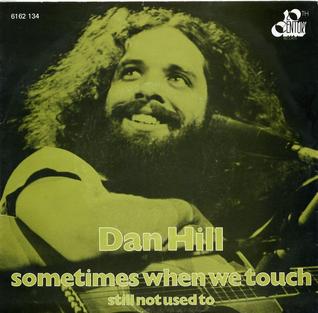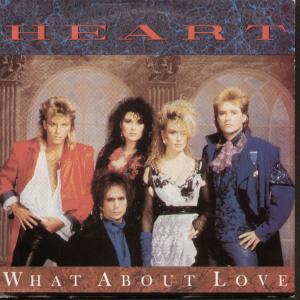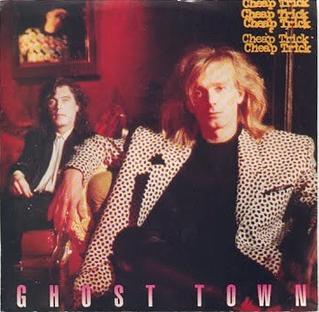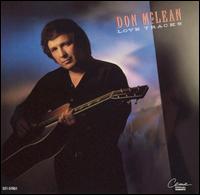
Donald McLean III is an American singer-songwriter and guitarist. Known to fans as the "American Troubadour" or "King of the Trail", he is best known for his 1971 hit song "American Pie", an eight-and-a-half-minute folk rock "cultural touchstone" about the loss of innocence of the early rock and roll generation. His other hit singles include "Vincent", "Dreidel", and "Wonderful Baby"; as well as his renditions of Roy Orbison's "Crying" and the Skyliners' "Since I Don't Have You".

Escape is the seventh studio album by American rock band Journey, released on July 17, 1981 by Columbia Records. It topped the American Billboard 200 chart and features four hit Billboard Hot 100 singles – "Don't Stop Believin'", "Who's Crying Now", "Still They Ride" and "Open Arms" – plus rock radio staple "Stone in Love". In July 2021, it was certified Diamond by the Recording Industry of America (RIAA) for at least ten million sales in the US, making it the band's most successful studio album and second most successful album overall behind Greatest Hits.

You Boyz Make Big Noize is the fourteenth and final studio album by the British rock group Slade. It was released on 27 April 1987 and reached number 98 in the UK Albums Chart. The album was largely produced by bassist Jim Lea, with two tracks produced by John Punter and another two by Roy Thomas Baker. It was the last studio album by the original lineup, prior to their split in 1992.

That's Why I'm Here is the eleventh studio album by singer-songwriter James Taylor released in 1985, four years after his previous effort, Dad Loves His Work. The album contains a version of Buddy Holly's "Everyday", as well as the participation of several singers, including Don Henley, Joni Mitchell, Graham Nash and Deniece Williams. "My Romance" was not on the LP or cassette version. "Only One" peaked at number 6 on the US Adult Contemporary chart and at number 3 in Canada.

Never Die Young is the twelfth studio album by singer-songwriter James Taylor released in 1988, three years after his previous effort, That's Why I'm Here. The album reached No. 25 on the Billboard 200 and eventually was certified Platinum by the RIAA. It features the title track, which peaked at No. 80 on the Billboard Hot 100, becoming the only charting single from the album.

I Can't Stand Still is the debut solo studio album by American musician Don Henley, drummer and co-lead vocalist for the Eagles. It was released in August 1982 by Asylum Records. Henley, Danny Kortchmar and Greg Ladanyi produced the album. I Can't Stand Still achieved gold status, and peaked at No. 24 on the Billboard 200 and at the same position on the UK Albums Chart. Three singles were released from the album, including the hit "Dirty Laundry", which peaked at No. 3 on the Billboard Hot 100 and became Henley's best-selling single. The title track "I Can't Stand Still" reached No. 48 and the track "Johnny Can't Read" reached No. 42 on the charts.

Daydream is the second album by the Lovin' Spoonful, released in 1966. It features two hits, "Daydream", which reached No. 2 in the U.S. Billboard Top 40 charts, and "You Didn't Have to Be So Nice".

"Vincent" is a song by Don McLean, written as a tribute to Vincent van Gogh. It is often erroneously titled after its opening refrain, "Starry, Starry Night", a reference to Van Gogh's 1889 painting The Starry Night.

"Sometimes When We Touch" is a 1977 ballad by Canadian pop rock artist Dan Hill, from his album Longer Fuse. It was written by Hill and Barry Mann; Hill wrote the lyrics, while Mann wrote the music.

"What About Love" is a song originally recorded by Canadian rock band Toronto in 1982. It was later recorded by American rock band Heart in 1985 and was released as the first single from the band's self-titled album, Heart. The band's "comeback" single, it was the first Heart track to reach the top 40 in three years, and their first top 10 hit in five. The song was also their first hit single on their new record label, Capitol Records. Grace Slick and Mickey Thomas, co-lead vocalists of Starship at the time, provide additional background vocals on the song.

A Bit of Liverpool, released as With Love (From Us to You) in the UK, is the third studio album by the Supremes, released in the fall of 1964 on the Motown label. It was produced by Berry Gordy with Hal Davis and Marc Gordon doing the mixing.

The Impressions is the debut album by the American soul music group of the same name. It produced six chart hit singles, including their biggest hit, the Billboard top ten pop smash "It's All Right", and the top 20 hit, "Gypsy Woman". After the departure of original Impressions lead singer Jerry Butler to a successful solo career, the other original members, brothers Arthur and Richard Brooks also left. The remaining original members, Curtis Mayfield, Sam Gooden and Fred Cash, chose not to replace them. Instead, they scaled down to a trio, and went on to become one of America's top R&B vocal groups.

Doc's da Name 2000 is the fourth studio album by American rapper Redman. The album was released on Def Jam Recordings on December 8, 1998. It peaked at number 11 on the US Billboard 200. It was a top seller, being certified platinum for sales of over a million copies.

Hat Trick is the third studio album by the American folk rock trio America, released on Warner Bros. Records in 1973. It peaked at number 28 on the Billboard album chart; it failed to go gold, whereas the group's first two releases had platinum sales. The album produced the single, "Muskrat Love", which reached number 67 on the Billboard singles chart and number 11 on the adult contemporary chart. That song would become a much bigger hit for Captain & Tennille three years later.

Beat & Soul is an album by The Everly Brothers, originally released in 1965. It peaked at No. 141 on the Billboard Pop Albums charts. It was re-released on CD in 2005 on the Collectors' Choice Music label.

Little Richard is the second album by American musician Little Richard, released in July 1958, ten months after Richard announced a retirement from rock and roll to pursue a life in the ministry. Like his first album, it largely contains previously released A-sides and B-sides including several which reached Billboard's Rhythm & Blues and Hot 100 charts. Nine of its twelve tracks charted in the US including Richard's fourth million-seller "Lucille", the rock and roll standard "Good Golly, Miss Molly" and "The Girl Can't Help It", the title song from the motion picture of the same name. Among the previously unreleased tracks are two Tin Pan Alley songs recorded in Richard's frantic style.

"Ghost Town" is a song by American rock band Cheap Trick, released in 1988 as the third single from their tenth studio album Lap of Luxury. It was written by Diane Warren and guitarist Rick Nielsen, and produced by Richie Zito. The song peaked at number 33 on the Billboard Hot 100.
"You Can't Blame the Train" is a song written by American singer-songwriter Terri Sharp. The original version was recorded by American singer-songwriter Don McLean in 1987 and family country group The Hollanders recorded their own version in 1991.

"How Sweet It Is (To Be Loved by You)" is a song recorded by American soul singer Marvin Gaye from his fifth studio album of the same name (1965). It was written in 1964 by the Motown songwriting team of Holland–Dozier–Holland, and produced by Brian Holland and Lamont Dozier. The song title was inspired by one of the actor and comedian Jackie Gleason's signature phrases, "How Sweet It Is!"
Joseph Hughes is a British bassist and songwriter, best known for being a member of the punk band the Flys and the new wave duo the Lover Speaks.


















